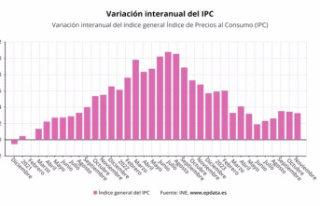BRUSELAS, 14 Dic. (EUROPA PRESS) -
The Council and the European Parliament agreed early this Thursday on the reform of the electricity market, which will make electricity prices less dependent on the volatile prices of fossil fuels, protect consumers from price increases and accelerate the deployment of renewable energies.
"Thanks to this agreement, we will be able to stabilize markets in the long term, accelerate the deployment of renewable and fossil-free energy sources, offer more affordable electricity to EU citizens and improve industrial competitiveness," highlighted the third and Minister for the Ecological Transition, Teresa Ribera, in her role as Spanish presidency of the Council.
The proposal is part of a broader reform of the design of the EU electricity market, which also includes regulation focused on improving protection against market manipulation through better monitoring and transparency (REMIT), which has already been discussed. reached an agreement also on November 16.
The provisional agreement, which must still be formally endorsed by both co-legislators, gives member states the possibility of exclusively supporting the purchase of new renewable generation when conditions allow it and in line with the decarbonization plans of EU countries.
Regarding voluntary standardized contracts, both institutions agreed to maintain their voluntary nature for Member States and also foresee an evaluation by the European Union Agency for the Cooperation of Energy Regulators (ACER) on the market for power purchase agreements. energy based on information from the database provided in the REMIT regulation.
Both co-legislators have agreed to make capacity mechanisms a more structural element of the electricity market and introduce a potential and exceptional exception to the application of the CO2 emissions limit for capacity mechanisms already authorized, when duly justified.
The agreement gives the Council the power to declare a crisis on the basis of a Commission proposal and sets out the criteria for declaring it in relation to the average wholesale price of electricity or a sharp increase in retail electricity prices.
Regarding the measures that Member States must adopt once the crisis is declared, both institutions agreed to take into account the existing possibility of *further reducing electricity prices for vulnerable and disadvantaged customers*, based on the current electricity directive. In addition, provisions are incorporated to avoid undue distortions or fragmentation in the internal market.
The Council and Parliament have also agreed to strengthen the measures to be implemented by member states to*protect vulnerable and energy poor customers, including the addition of the definition of energy poverty accompanied by a reference to the new directive of energy efficiency that takes appropriate measures.
Both co-legislators agreed to enter into two-way contracts for differences or equivalent systems with the same effects as the model used when public financing in the form of direct price support systems is involved in long-term contracts.
Bidirectional contracts for difference would apply to investments in new power generation facilities based on wind energy, solar energy, geothermal energy, damless hydroelectric energy and nuclear energy.
The rules for these two-way projects will only apply after a transition period of three years after the entry into force of the regulation, in order to maintain legal certainty for ongoing projects.
Likewise, it states that the income from these contracts would be redistributed to end customers and could also be used to finance the costs of direct price support plans or investments to reduce electricity costs for end customers.













